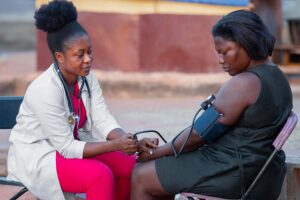Blood donation is one of the most selfless acts you can perform to save lives. Every year, millions of people around the world, including Nigeria, rely on blood donations for surgeries, accident recoveries, childbirth, and treatments for various conditions like anemia and cancer. But who can donate blood? What are the eligibility criteria? And what myths surround blood donation? Let’s dive into this essential life-saving process and explore the facts and benefits of blood donation in Nigeria.
Blood Donation: A Lifesaver for Every Community
The demand for blood is always high. But, with a limited supply, it’s critical to understand who can donate blood, the process, and why it’s so important. Whether it’s plasma donation, platelet donation, or whole blood donation, each donation type serves a unique need in medical care. In Nigeria, blood donation can save lives during emergencies, surgeries, and treatments for various health conditions.
Eligibility for Blood Donation in Nigeria
To ensure that blood donations are both safe for the donor and useful for the recipient, several eligibility guidelines must be followed. Here’s a breakdown of who can donate blood in Nigeria.
1. Age Requirement:
Most blood donation centers, including Oneus in Nigeria, accept donors aged 18 to 65. Teenagers under 18 and individuals over 65 may not be eligible unless they have medical approval.
2. Health and Weight Standards:
A healthy donor should weigh at least 50kg (110 lbs). Donors must be in good health and free from any contagious diseases. Those with chronic illnesses such as uncontrolled diabetes, high blood pressure, or recent surgeries may be deferred from donating.
3. Blood Group and Rhesus Factor:
Blood donation eligibility also depends on your blood group and rhesus (Rh) factor. Common blood groups include O positive, A positive, B negative, etc. However, it’s not just about the blood type; understanding your rhesus factor (positive or negative) is essential when matching donors and recipients for compatibility.
4. Genotype Considerations:
Your genotype plays an important role in blood donation. Donors with sickle cell anemia (SS genotype) may not be eligible due to the potential risk of complications. However, AA and AS genotypes are typically accepted, as they are less prone to complications from blood donation.
Plasma and Platelet Donation: More Ways to Help
While whole blood donations are crucial, plasma donation and platelet donation also make a massive impact. Plasma is the yellowish fluid component of blood, and it plays a key role in clotting and immune function. Plasma donation is particularly vital for patients with burns, trauma, or immune disorders.
Plasma donation centers in Nigeria, like Oneus, offer the opportunity for individuals to give plasma separately, ensuring a more specialized approach to saving lives.
The Myths About Blood Donation – Debunked!
Myth 1: Blood Donation is Painful
The idea of a needle being inserted into your arm can be intimidating. However, the pain is minimal and short-lived. Most donors report feeling only a small pinch at the beginning of the process. Afterward, they feel fine.
Myth 2: Blood Donation Causes Weakness
Donating blood does not leave you weak or tired. The body quickly replaces the blood, and within a few days, you’re back to your normal self. In fact, blood donation benefits include increased energy levels due to improved circulation.
Myth 3: You Can’t Donate Blood if You’re Underweight or Overweight
This is simply not true. As long as you meet the minimum weight requirement of 50kg (110 lbs) and you are otherwise healthy, you are eligible to donate.
Myth 4: Selling Plasma is Dangerous
While selling plasma can be seen as controversial, plasma donation is safe when done at reputable centers. Selling plasma is regulated to ensure donor safety, and it can help people who need plasma for life-saving treatments.
Benefits of Blood Donation: More Than Just a Good Deed
Blood donation doesn’t just help others; it can also benefit your health. Here are some surprising blood donation benefits:
-
Improved Cardiovascular Health: Studies show that regular blood donation can lower the risk of heart disease by reducing iron levels in the blood.
-
Blood Donation and Skin Health: Donating blood has been linked to improved skin appearance, as it stimulates the production of new blood cells, promoting a fresh, healthy glow.
-
Reduced Cancer Risk: Some research suggests that regular blood donation may lower the risk of certain cancers, including liver and lung cancer.
Why Blood Donation is Critical in Nigeria
With a growing population and frequent medical emergencies, the need for blood is significant in Nigeria. Blood donation drives, like those organized by Oneus in Nigeria, ensure that hospitals are stocked with sufficient blood supplies for all types of medical procedures, from emergency surgeries to cancer treatments.
Unfortunately, the current blood donation rate in Nigeria remains low, and there’s a constant need to educate people on the importance of donating blood. Private cord blood banking, bone marrow donation, and stem cell donation are also expanding fields that can make a huge difference for patients in need.
Take Action: Give Blood, Save a Life
Donating blood is a simple, life-changing act. By understanding the eligibility, debunking myths, and recognizing the benefits, you can make an informed decision to help save lives.
If you’re ready to donate, don’t hesitate—give blood, save a life! Visit Oneus’s blood donation website to book your donation today. For inquiries, contact us at info@oneusng.com or call +234 902 168 2822. Visit us at Oneus Blood Donation.
Every drop counts, and so do you. Your donation today could be the lifeline someone desperately needs tomorrow.




